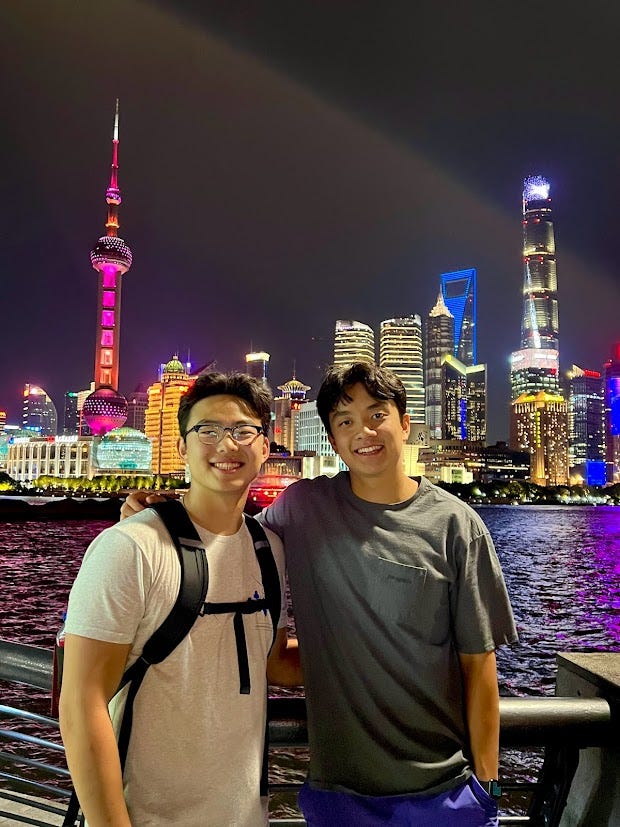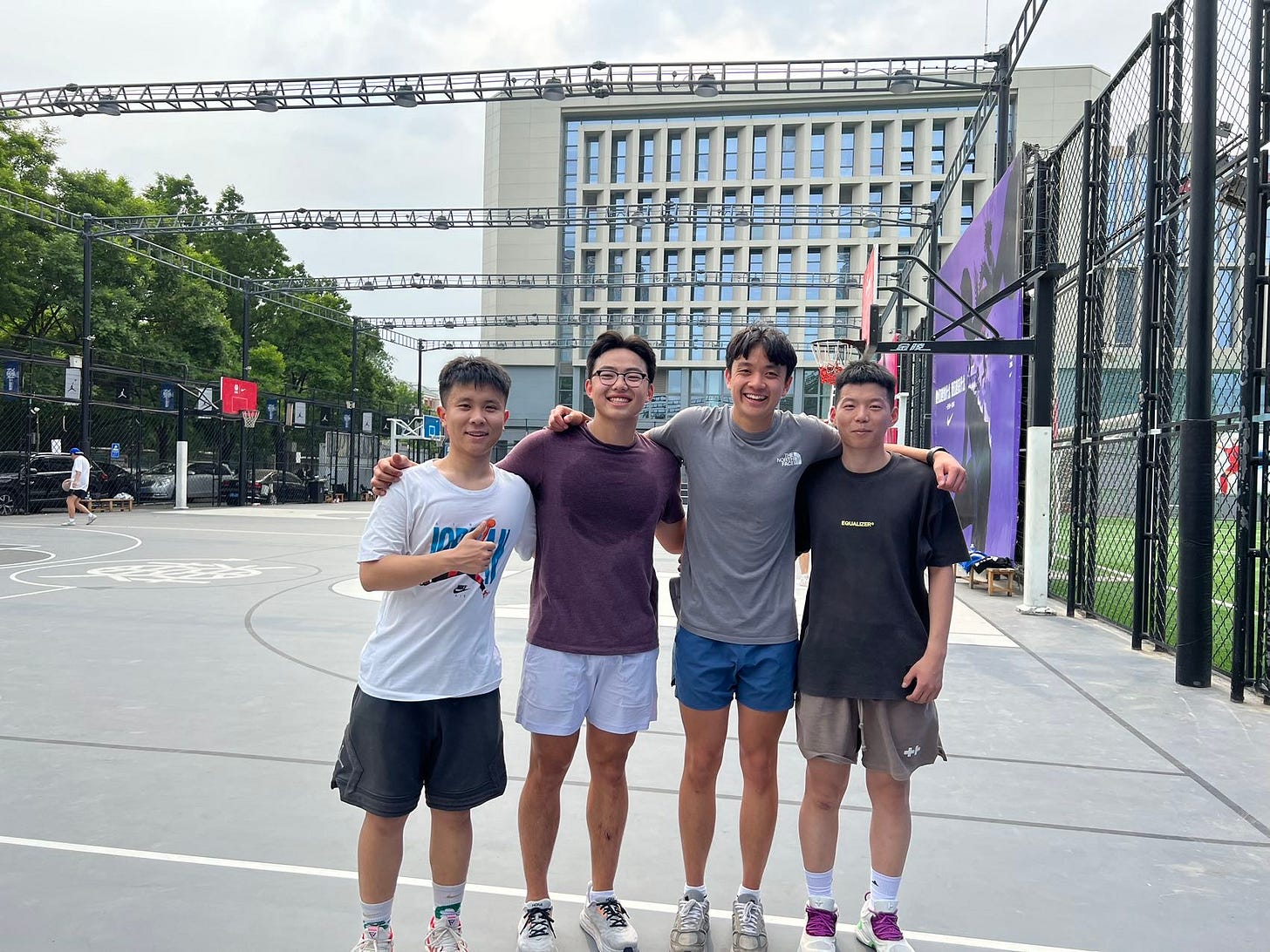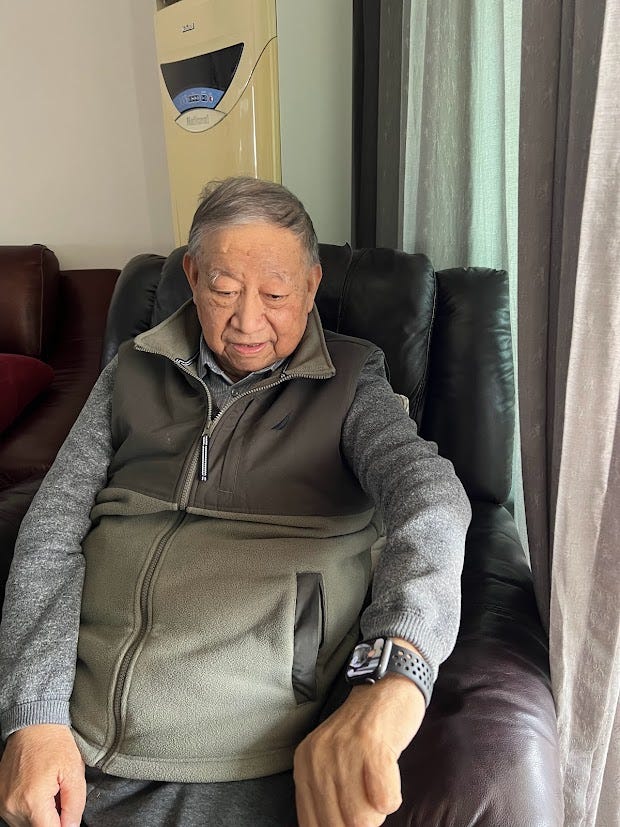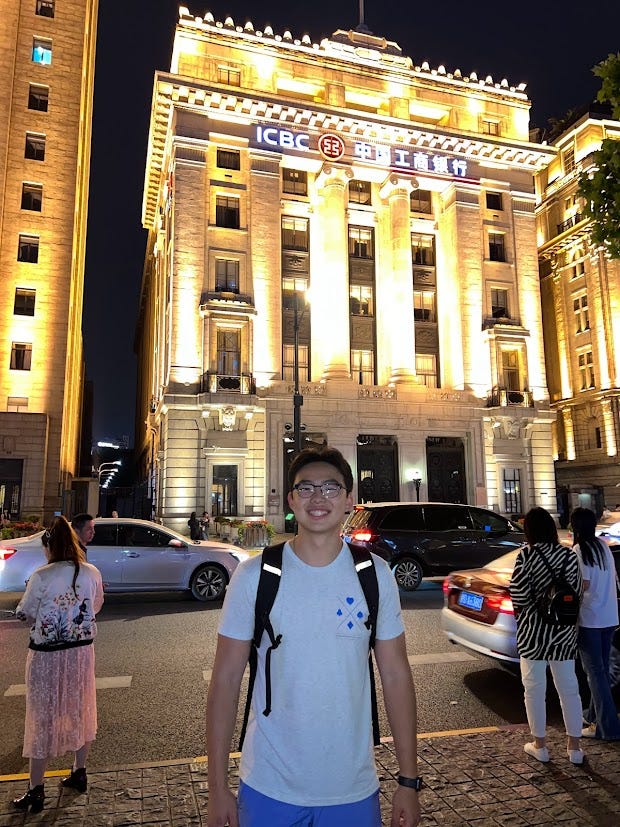This is my first attempt at a co-written blog post. I’ve always liked the idea of merging the thoughts of two individuals but struggled with coming up with a feasible format. In this piece, I’m joined by my roommate and semi-doppelganger, Kevin Li, to try. Here’s our attempt at writing together without labeling who writes what:
Kevin and I completed a wild trip last summer. We spent three weeks in Asia and divided our trip into three sections: Beijing, Shanghai, and Japan. The first two legs looked a little different for each of us. I flew directly from Austin to Maryland (home sweet home) for a couple of days before hopping on a cheap EgyptAir flight to Beijing. That leg of the trip involved a 19-hour layover in Cairo – probably the reason it was so inexpensive. From there, I met up with Kevin and spent a few days in Beijing – where his family is from – before taking a train down to Shanghai – where my family is from – alone. After a couple of days, Kevin came down, and we spent another week together there. Following that, we flew separately to Japan and explored Kyoto, Kobe, Fujiyoshida (Mt. Fuji), and Tokyo. I had a blast exploring these major Asian cities and would love to detail everything we did, but I don’t want this to be a travel blog. I’ll let Kevin outline our goal with this piece.
When Josh first asked me to co-write this blog post, I thought it was a great idea. Now, almost a year of procrastinating later and Josh badgering me weekly to start writing, I’ve finally put paper to pencil (or fingertip to keyboard). Rather than going into detail about the activities we did and the foods we ate, we’re going to focus on a couple of broader topics we started talking about because of what we saw during the trip.
The original idea of co-writing something like this spawned when we were in Shanghai, during the second leg of our trip. Having gone through a whole day of running around the city exploring massive malls and trying unique dishes, we were on our final subway ride back to Josh’s grandparents' apartment where we were staying. In the almost delirious state of exhaustion we were in, Josh mentioned how much his family had aged in just the four years it had been since he visited pre-COVID. From there, a long conversation began about the changes we’ve noticed and the new perspectives we’ve taken on. It was interesting how different the thoughts we had on this trip were from the ones I had the last time I was in Asia. The gap in time and the personal growth we had both experienced since made the conversations particularly eye-opening. This piece is a scrappy summary of that conversation.
Cultural Observations
Like Josh, it had been three years since I had been to China. Unlike him, I had a lot more exposure to China growing up. When I was in first grade, my family moved to Beijing where I attended international school. Because of this, one thing I noticed was the immense increase in security and the generally inconvenient environment for foreigners.
As soon as I landed, this change was apparent in the way that customs were handled. Before, customs was a quick process with some surface-level questions, if any. This time, however, I had fifteen minutes of questions regarding very specific information including my Chinese name. Luckily, I knew how to speak Chinese but for the family next to me who didn’t, there didn’t seem to be any form of efficient communication.
Before we left, Josh and I made sure to scour Reddit to find a VPN that would work in China. Even from the time I lived there, sites like Instagram, YouTube, and Gmail were blocked. It was commonplace for everyone to use one of the major VPN providers like ExpressVPN or Nord, but now it seemed like China had found a way to erect unbreakable firewalls that none of these services could circumvent. We ended up using a service called Astrill VPN (not sure if this still works) for a pretty steep price and a very shady app. Even with this extra effort, the experience was pretty spotty with a lot of the services being extremely slow or even inaccessible.
The biggest roadblock that we soon discovered after landing, however, was the entirely new payment system being used. Almost nowhere would take cash, and only high-end restaurants would take credit cards. The default way to pay was through your WeChat wallet with many places only having QR codes for customers to scan and pay using the app. This was a huge difference from the very cash/card-heavy ecosystem I remembered.
None of this would have been an issue for Josh and me, but you needed a Chinese bank account linked to your name to create a WeChat wallet – we had no idea where to even begin with that process. Since Josh and I wanted to eat and experience all of the local shops, we ended up just borrowing my Grandma’s phone and WeChat account, which already had everything set up. The changes in security and daily logistics left a big question mark on how easy it would be to one day visit China on my own.
My observations on the differences since the last time I visited revolve more around the idea of being Chinese-American. In America, though we might speak perfect English, wear Tecovas cowboy boots, and play golf, Kevin and I look Chinese. In China, while we (and I hate to feed into the stereotype) look like everyone else, it is still abundantly obvious that we’re foreigners. Growing up, my grandparents always reminded me that I had a zhong guo lian or Chinese face. For some reason, however, my face felt a little less Chinese in China.
Going back to Shanghai after four years, meeting distant relatives and family friends is a given. People that you vaguely remember start hitting you with “I’ve known you since you were this tall”, “Wow you’ve grown so much since the last time I saw you” or “What a handsome young man, I bet he can bench 225” – that’s to be expected. But, what I noticed this time was that a lot of the comments and compliments centered around being American. At times, it felt like I was paraded around for my nationality.
Looking back on my childhood, it’s clear that meeting people in China has always felt like a parade. Now, with a slightly larger frame and slightly more accomplishments, it’s become even more apparent. When I think of my family’s origins, however, it makes sense. Coming from the poorer communities of Shanghai, very few of the people from my parents’ childhood made the journey to America. Now, after almost four decades, sometimes I feel like I stand as living proof that their hard work and struggles were all worth it. In those moments and the added pressure that comes with them, the American in Chinese-American feels extra heavy.
Outside of meeting family friends and distant relatives, Kevin and I felt noticeably more American and, in turn, less Chinese when interacting with locals. Playing basketball in Beijing and Shanghai was a big indicator of this.
We played basketball twice on our trip – once in each city. At first, differences in playing style stuck out to us: no checkup, very few three-pointers, and unorthodox shooting forms. We tried to blend in at first, saying hao qiu instead of nice shot. But, our English slipped out here and there, and it was quickly established that we were American. After that, possibly due to immature competitiveness and arrogance, there was a feeling of obligation to be better than our competition. It became an us vs them, even though we all just looked like them. Eventually, though, we ended up becoming friends with two of our teammates – even connecting via WeChat.
Kevin’s perspective on how Chinese culture has changed, especially toward foreigners, is something I’ve thought about recently as well. I plan to go back when I graduate, and I want to bring my non-Chinese friends. When that happens, I’m sure I’ll have even more perspective on what it’s like as a foreigner in China.
On Old People
China’s aging population crisis is no joke. Although it may have been due to spending time with our own family, Kevin and I spent an absurd amount of time with people more than three times our age – a combination of socializing with elderly strangers in my broken Chinese, spending long overdue time with my grandparents, and being analyzed by older family friends (a huge ego boost at times). Through those interactions, I had a number of thoughts regarding the experiences of the elderly.
Understanding Relationships
Five years is a long time. Between the last time that I visited Shanghai and now, I experienced loss – a feeling once foreign to me – and saw the changes that come with growing old. It was through witnessing family members age and the subsequent reliance on a spouse in the later years that I got a glimpse at the true meaning of a lifelong partner.
I’ve never been married (hopefully one day), but I know traditional wedding vows go something like this:
“In the name of God, I, (groom's name), take you, (bride's name), to be my wife, to have and to hold from this day forward, for better, for worse, for richer, for poorer, in sickness and in health, to love and to cherish, until we are parted by death.”
From my experience with watching rom-coms, I’ve heard this phrase countless times. Hell, I’ve even thought of what it might feel like to say it sometime down the line. Still, I don’t think I’ve processed what the vow was actually saying. For better, for worse, for richer, for poorer, in sickness and in health.
Life is inevitably a rollercoaster. The unavoidable highs and lows, as well as the expiration date of living, are both beautiful and scary – it’s what makes life worth living. For better, for worse, for richer, for poorer, in sickness and in health. My grandparents have lived through each of those scenarios together, at extremes that I can’t comprehend – lower lows and higher highs than anything I’ve experienced thus far. This realization added a new dimension to how I view romantic relationships. On the rollercoaster with unknown twists and turns, only one person is sitting next to you for the entirety of the ride: your spouse.
I think this is especially true for men. It’s thrown around pretty often that men die earlier than women. Anecdotally, I found this true as well. At a graveyard in Shanghai, couples are buried together with a shared tombstone. Walking around, I noticed that the majority of one-name tombstones were of males with a saved, unfilled spot for their spouse. For the couple tombstones, it always seemed like the death date for the male was earlier. This means that for dudes, your spouse really is your 4-lifer.
I’ve always known that who you marry is a pretty big deal – my friend Eli likes to say that it’s a “top three most important life decision”. But, after coming back from China, the magnitude of that reality seems significantly heightened. With this in mind, it’s hard to see the appeal of casual dating or dating without intention in general. There’s a common phrase that goes something like you either date to marry or date to break up. I get that some people probably have wildly different takes on this based on personal value systems, but it’s hard to ignore the pressure of finding the right life partner.
Small note here: I originally wrote this section almost a year ago, a couple of weeks after finishing the trip with Kevin. Since then, this area of my life has seen the biggest amount of change. In the months after coming back, I interned in Austin and became close friends with my now girlfriend (after dating for about half a year this is still pretty crazy to say). Throughout our relationship so far, I’ve kept in mind a lot of my takeaways from China that I wrote about earlier and have been lucky enough to find someone who shares the same perspective. Crazy how life works sometimes!
Understanding Happiness
When I think about the things that make me the happiest, some kind of physical movement is typically involved: playing sports, exploring new cities, going to new restaurants, hanging out with my buddy Kevin. As lazy as I like to be sometimes, it’s hard to imagine life without the amount of activity I’m used to. As you can probably imagine, elderly people do a lot less than kids in their 20s. Even in a city like Shanghai, there are days – sometimes many in a row – when my grandparents wouldn’t go outside of a one-mile radius of their apartment. Sure, some of that can be blamed on the pandemic’s disruption of life in China, but some days they prefer to be at home.
I don’t think my perspective is that life sucks when you get older, but the lifestyle change is probably what I’m least excited about in the far future. The thought of pickup basketball, traveling the world, and going on food tours turning into afternoon tea, walks around the neighborhood, and guided walking tours is just sad. This thought process explains my initial disdain for the lifestyle that I saw my elders living – a view I now feel is immature.
Eli, who I mentioned earlier, wrote a piece called People, not Places where he argues that the utility felt in personal interactions outweighs that in the actual activity or experience itself. In a separate article, Eli also talks about the importance of building things to look forward to – half the fun is anticipation after all. These two perspectives – while extremely applicable to life as a 20-something-year-old – ring especially true in old age.
When activities lose their charm, anticipation and camaraderie fill in. The boring, monotonous everyday walks and tea accompanied by friends and family are often the highlights of my grandparents’ day. It seems as though the scale for which happiness and excitement are measured shrinks greatly – as if they’ve gained the unique ability to enjoy the little things.
A quick, slightly morbid note: it’s difficult not to wonder if elderly people were just waiting for the end. Is living a mundane lifestyle just stalling the inevitable? Answering this is far above my pay grade, and I don’t know if I’ll be able to accurately answer this until I get to that age myself. But, I did find this pretty interesting article where the perspectives 95+-year-olds gave on death ranged from “I’m waiting to go” to “I’m only in the way” to “I’m worried about others.”
The time we spent with elderly individuals was extremely eye-opening and an experience I’d recommend to any young person. Using their approach to life to develop a perspective on life now is valuable. My good friend, Liam, wrote a piece called Write Your Physical Obituary. In it, he talks about forming goals today to help you achieve certain milestones later in life. Lift weights and run now, so you can lift your grandchildren and play with them outside when you’re older. That mentality should be applied to life in general. Take the perspectives from the elderly on their lives and apply them to how you should live your life today.
While Josh went ahead to Shanghai to see his family a couple of days before me, I got the chance to spend a lot of time with my grandma. Wanting to include me in all her day-to-day activities, she took me along one of her biweekly field trips. This week’s trip was to the outskirts of Beijing with her elderly group to pick peaches.
As it turns out, my presence wasn’t only for fun. Every person in the group had either an aide or a family member as company. The drive there was over an hour of conversation and fielding questions, relying on my grandma as a partial translator (not the most effective considering she doesn’t speak English). Most of my grandma’s friends in this group were retired hospital staff from where she used to be a doctor, and it was really cool to hear sprinkles of them laughing about things their shared experiences from decades ago – similar to the way my friends and I talk about freshman year.
When we finally arrived, we were a little past the 6th ring road (Beijing is split into six concentric circles called “rings” with important historical landmarks being in the center). I was ready to run ahead and start picking (and sampling) peaches. However, that didn’t seem to match the vibe of the group which involved a light stroll through the rows of peach trees, looking closely at some of the fruit, talking about it, and then repeating the process. Less than half an hour later, everyone had already gathered back at the bus, ready to take a quick group picture to commemorate the adventure, before heading back into the city.
This was one of my favorite days during my stay in Beijing, largely because of the conversations that I got to have with my grandma, but also because of the similar perspective shift regarding life as an older person I had as Josh. These elderly groups were very hard to organize. Most of the members were not physically capable of running around the city on public transportation on their own, so they needed a bus, aides, and other family members. Almost all of them also had grandchildren, or even great-grandchildren, that they were helping raise.
Time with friends trying new activities and foods was very far and few between. Most people, including my grandma, in these groups only attend a gathering once a month, if that, and even when the effort is made to participate, what they end up doing is night and day from what people my age are used to. Similar to what Josh wrote, there seems to be a positive correlation between age and the ability to enjoy the little things. As I continue my own life, I see immense value in appreciating the moments that I previously would have considered mundane.







Nice blog! Thank you and Kevin for sharing your views and experiences in a foreign country which is not foreign :-)
Experience, Travel ~ theses are as education itself!
Great work guys!